|
|
|
Sort Order |
|
|
|
Items / Page
|
|
|
|
|
|
|
| Srl | Item |
| 1 |
ID:
183898
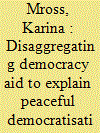

|
|
|
|
|
| Summary/Abstract |
Democratisation is hailed as a pathway to peace by some, yet, blamed for provoking renewed violence by others. Can democracy aid explain the effect of democratisation after civil war? Building upon findings that transitions to democracy are prone to violence, this article shows that external democracy aid can mitigate such negative effects. It is the first to disaggregate democracy aid and analyse its effect on peace after civil war. To this end, it uses a configurational approach and focuses on support for competition (for example, promoting free and fair elections), institutional constraints (for example, strengthening the judiciary), and cooperation (for example, facilitating reconciliation). Combining Qualitative Comparative Analysis (QCA) with an illustrative case study on Liberia, it demonstrates that democracy aid can help to prevent recurrence during postconflict democratisation. Two pathways can explain peaceful democratisation: first, fostering ‘cooperative democratisation’ characterised by substantial support for cooperation in lower-risk contexts; and second, fostering ‘controlled competition’ by combining substantial support for institutional constraints and competition. Importantly, democracy support does not trigger renewed violence. These findings speak to the academic debate on the destabilising potential of democratisation processes after civil wars and inform policymakers designing postconflict support strategies.
|
|
|
|
|
|
|
|
|
|
|
|
|
|
|
|
| 2 |
ID:
091713
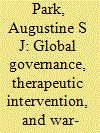

|
|
|
|
|
| Publication |
2009.
|
| Summary/Abstract |
The victimization of girls in armed conflict has garnered increased attention, yet recent scholarship shows that postconflict measures fail to meet girls' unique needs. This article examines gendered discourses employed in programming designed to assist girls following Sierra Leone's decade-long civil war, drawing on fieldwork conducted as part of a continuing program of study on peacebuilding in Sierra Leone. Specifically, the article presents a case study examining discourse relating to war-affected girls in one Freetown-based NGO, Connecting for Peace, which delivered programming to boys and girls affected by the war.
|
|
|
|
|
|
|
|
|
|
|
|
|
|
|
|
| 3 |
ID:
090436
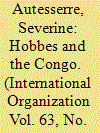

|
|
|
|
|
| Publication |
2009.
|
| Summary/Abstract |
Why do international peacebuilders fail to address the local causes of peace process failures? The existing explanations of peacebuilding failures, which focus on constraints and vested interests, do not explain the international neglect of local conflict. In this article, I show how discursive frames shape international intervention and preclude international action on local violence. Drawing on more than 330 interviews, multi-sited ethnography, and document analysis, I develop a case study of the Democratic Republic of Congo's transition from war to peace and democracy (2003-2006). I demonstrate that local agendas played a decisive role in sustaining local, national, and regional violence. However, a postconflict peacebuilding frame shaped the international understanding of violence and intervention in such a way that local conflict resolution appeared irrelevant and illegitimate. This frame included four key elements: international actors labeled the Congo a "postconflict" situation; they believed that violence there was innate and therefore acceptable even in peacetime; they conceptualized international intervention as exclusively concerned with the national and international realms; and they saw holding elections, as opposed to local conflict resolution, as a workable, appropriate, and effective tool for state- and peacebuilding. This frame authorized and justified specific practices and policies while precluding others, notably local conflict resolution, ultimately dooming the peacebuilding efforts. In conclusion, I contend that analyzing discursive frames is a fruitful approach to the puzzle of international peacebuilding failures beyond the Congo.
|
|
|
|
|
|
|
|
|
|
|
|
|
|
|
|
| 4 |
ID:
157543


|
|
|
|
|
| Summary/Abstract |
How are global norms translated into local contexts? I examine the translation of three rule-of-law norms in postconflict Guatemala: the UN Convention on the Rights of the Child, the right to access public information, and best practices for international rule-of-law commissions. These cases, I argue, do not fit established models for diffusion, such as those associated with standard bargaining approaches, norm socialization frameworks, and norm localization theory. Instead, rule-of-law promotion triggered domestic contestation and, subsequently, what I term an “interactive translation loop.” These processes changed the modes of interaction among rule-of-law promoters and how the norms ultimately translated into the Guatemalan context. I demonstrate that a critical variable, the precision of international norms, conditions the leeway available for such translations. To the extent that my framework travels to other cases, it offers an important corrective to established theories of how global norms translate into local contexts.
|
|
|
|
|
|
|
|
|
|
|
|
|
|
|
|
| 5 |
ID:
149482
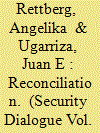

|
|
|
|
|
| Summary/Abstract |
There appears to be a rift between the theoretical and normative understandings of what reconciliation means and offers, and what people expect to happen in postconflict scenarios. Here we present a conceptual framework that captures the definitional diversity surrounding the concept of reconciliation and then operationalizes it in order to analyze responses from postconflict populations. The illustrative application of our framework to responses from a representative survey of 1,843 Colombian citizens reveals that people’s convictions are just as diverse as scholars’. Nevertheless, significant proportions of respondents seem to understand reconciliation to be primarily a psychological and political process which aims to achieve the re-establishment of quotidian or day-to-day relations and cooperation; which should be preceded by the cessation of violence, dialogue, goodwill, and attitudinal and emotional change; and which should be accompanied by social welfare and security. It is noteworthy that understandings of reconciliation as a process mediated by justice, truth, and memory are scarce. The application of this framework will help to reveal differences between hopes and promises, and inform scholarly work and policymaking that is more realistically rooted.
|
|
|
|
|
|
|
|
|
|
|
|
|
|
|
|
| 6 |
ID:
158454


|
|
|
|
|
| Summary/Abstract |
This essay contrasts the two extremes used to address civil wars and weak states: costly and ill-designed interventions (Approach A) or minimalist approaches in which international actors either stay away or engage only to broker a deal or depose a dictator, but fail to build institutions and consolidate peace afterward (Approach C). This essay posits an alternative, a sovereignty strategy (Approach B), which would see core functions established in a sequence carefully tailored to context and delivered through partnerships between state, market, and civic actors over a period of decades. It analyzes whether a sovereignty strategy could be both feasible and affordable as an alternative to Approach A or C, whose costs are also very real, taking into account the costs and benefits of each option.
|
|
|
|
|
|
|
|
|
|
|
|
|
|
|
|
| 7 |
ID:
083825
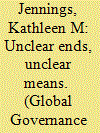

|
|
|
|
|
|
|
|